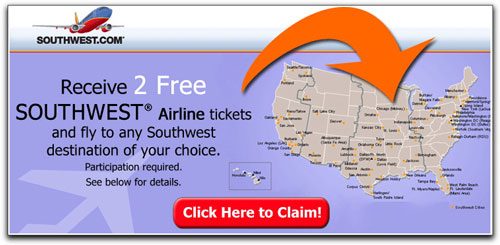« Impending Boom/Doom Tricks | Main | Brand Name Rewards Spam »
| Home | The Book | Training | Events | Tools | Stats |
February 06, 2008
Flying Close to the Sun with Wax WingsHere's a simple two-part quiz.
Q1. What does the following email Subject: line mean to you?
Subject: Airline confirmation: southwest airline confirmation
A1. In the travel biz (and elsewhere), a confirmation is an acknowledgment of an existing reservation; it's an assurance that a seat, a car, a room is being held in your name. True, sometimes there are snags (e.g., overbooking), but holding that confirmation gives you the power to really get in the agent's grill with your demand for whatever it is the outfit has confirmed.
[TV game show bell, signifying a correct answer.]
Q2. What does the following image in the message body mean to you?
A2. Oh goodie! I can click the red button (actually, a flashing animated image in the original) to claim my two free Southwest Airline tickets...tickets that (according to the Subject: line) have been confirmed! Woohoo!
[Loud TV game show "wrong answer" buzzer sound.]
Oooh, sorry. No, the correct answer is "Ugh, I'll have to jump through hoops from now until Julune, hand over all the email addresses of my friends to spammers, and probably buy stuff first."
The "details" are presented in small, gray text (and in a spelling-challenged way):
"Free" may not be exactly free, certainly not when you measure the time you'll spend completing the various precious metal offers. And that "Purchase may be required" stipulation? "Maybe" my eye.
The FTC recently settled with a company making similar offers. To the tune of $200,000. According to the FTC press release:
When consumers arrive at Member Source Media's promotional Web pages, they are led through a series of ads for goods and services from third parties. To "qualify" for their "free products," consumers must first wade through pages of "optional" offers. If they clear this hurdle, they discover that they must "participate in" a series of third-party promotions that requiree [sic] them to do things such as purchase products, subscribe to satellite television service, or apply for multiple credit cards.
It's unclear to me if the offenders in the recent FTC action mentioned the "participation" business in their email messages. It could be that our Southwest Airlines offer spammer includes these disclaimers to stay just this side of last month's ruling. I also haven't visited the site to see how they state their offers and details—links are heavily coded with an identifier for my email address, and I don't want to validate it as being a good one.
But, even if they tell you up front what hoops you will be jumping through, I still have an issue with the Subject: line of this email message. Part of the FTC complaint addressed deceptive headers in the other case, leading me to hope that there might be something for them to look into here.
The CAN-SPAM law has had a weird effect on different types of email marketers. Those who use genuine confirmed opt-in mechanisms to stay in touch with their customers have been sweating the details to make sure they comply with the law completely and unambiguously. Then you have the spam mills operating in the open who seem to want to test just how high their Icarus-like wax wings will let them fly. Is there a potential upside to global warming?
UPDATE: See the follow-up to this entry.
Posted on February 06, 2008 at 10:13 AM


